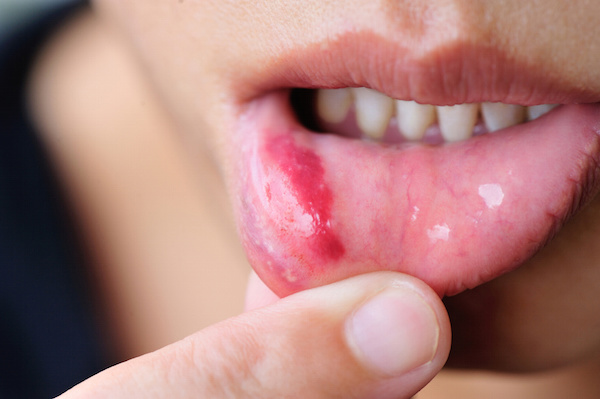
Causes, treatment, and prevention of canker sores
If you’ve ever suffered from a canker sore, you know they can be painful and distracting. Today we’d like to share some information on how canker sores develop, how they can be treated, and how they’re linked to your overall oral health.
A canker sore is a type of mouth ulcer known medically as an aphthous ulcer. Aphthous ulcers are one of the most common complaints of the mouth, occurring at any age but being more likely in younger adults and in women. A first episode often occurs during adolescence, although children as young as 2 years have been known to develop canker sores. Between 20% and 30% of the population suffers from recurrent episodes of canker sore flare-ups.
Causes of canker sores
Basically, science hasn’t discovered a direct cause to date. We know there are correlations with viruses, but canker sore etiology isn’t quite defined. Oftentimes, canker sores are confused with other sores that do have a direct causation. Fever blisters, for example, and their association with the herpes virus are not the same as a canker sore.
Aphthous ulcers are sometimes associated with other conditions needing medical attention, such as inflammatory bowel disease, compromised immunity, allergies and nutritional deficiency. While there is no firm understanding of why canker sores occur, a number of factors are thought to have some involvement, including changes in hormones (including pregnancy or menopause), physical trauma (damage to the lining of the mouth), drugs, food allergies or hypersensitivity, or deficiencies in iron, folic acid, or B12. The final contributing factor is also stress.
While recurrent aphthous ulcers affect 20-30% of the population, the the US Surgeon General notes that rates are higher among specific groups, including health professional students.
Symptoms of aphthous ulcers
Canker sores have clear features, which include:
- Well-defined, round ulcers smaller than a centimeter across. Usually shallow in the mouth’s lining.
- White or yellow-gray center surrounded by an inflammatory red margin. They often fade to gray over time.
- They usually form in the front part of the mouth inside of the lip, inside of the cheeks, or under the front or sides of the tongue.
- Persistent for a week or two before healing.
Common canker sores usually heal without the need for medical treatment. More severe or recurrent cases may be eased by prescribed medications that help with symptoms but don’t cure the sores.
If your canker sore lasts more than 2 weeks without improving, if it gets worse over time, if they recur 3 times a year or more, or if they’re accompanied by fever, diarrhea, headache, or rash, you should talk to your doctor to rule out other issues.
Remedies for canker sores
The following remedies may help alleviate discomfort from canker sores:
- Mouthwash:
- Rinse with mild mouthwash or salt water 3-4 times per day
- Mix water and hydrogen peroxide in a 50/50 solution and use a cotton ball to apply to the sore
- Apply a small amount of milk of magnesia to the sore to soothe.
- Echinacea (herbaceous flowering plant) may have an immune modulatory effect to reportedly speed healing
- Carrot, celery and cantaloupe juices may speed healing when taken orally at the onset of lesions
- Avoid spicy foods
Severe or persistent cases of canker sores need to be checked by a doctor to rule out associated conditions like inflammatory bowel disease (IBS), compromised immunity, allergies, or nutritional deficiency. When necessary, doctors may prescribe antibiotics to minimize inflammatory irritation by preventing bacterial aggravation. They may also prescribe anesthetics to help with irritation and pain.
Preventing canker sores is difficult since we do not yet know what causes them. You can, however, prevent them from getting worse by avoiding:
- Abrasive foods or those that can stick in the mouth (potato chips, for example)
- Spicy, acidic or hot foods and drinks
- Traumatizing the ulcers (through harsh contact with toothbrush bristles, for example).
If you’ve suffered from canker sores and you’re unsure whether there’s a dental problem contributing to the discomfort, contact us at Artistic Touch Dentistry today and we’ll check for abrasive surfaces on the teeth, irritation caused by appliances or piercings, or other irritants in the mouth.
References:
MacGill, M. (2016, January 15). “Canker Sores: Causes, Remedies and Prevention.” Medical News Today. Retrieved from
http://www.medicalnewstoday.com/articles/303311.php.

